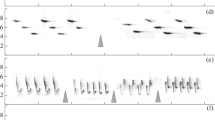Summary
Playback experiments on individuals singing near their nest show that starlings tend to repeat the theme they have just heard even if it is an unfamiliar dialect and not ‘programmed’ in their own current sequence. The type of response and its temporal characteristics could be related to internal sequential organization rules. Moreover, starlings discriminate between two dialectal variants of a given theme and respond more often and more quickly to the familiar dialect. A social influence on the choice of theme by the individual can also be observed in foraging flocks and roosts where song is frequently given. Observation of such groups reveal that one theme predominates on each given occasion and that it depends on the number of individuals present and on the type of group (flock or roost). This is probably a function of the tendency to match. Previous observations of flights toward the roost showed that birds originating from different dialectal areas congregate in such groups. A few analyses of songs in flocks and roosts confirm the presence of different dialects simultaneously.
Similar content being viewed by others
References
Adret-Hausberger M (in press) Variations dialectales des sifflements de l'étourneau sansonnet sédentaire en Bretagne. Z Tierpsychol
Armstrong EA (1963) A study of bird song. Oxford University Press, London
Baker MC (1975) Song dialects and genetic differences in whitecrowned sparrows (Zonotrichia leucophrys). Evolution 29:226–241
Baker MC, Thompson DB, Sherman GL, Cunningham MA (1981) The role of male vs male interactions in maintaining population dialect structure. Behav Ecol Sociobiol 8:65–69
Clergeau P (1981) Dynamique des dortoirs d'étourneaux du bassin de Rennes. Alauda 49:13–24
Chamberlain DR, Cornwell GW (1971) Selected vocalizations of the common crow Auk 88:613–634
Counsilman JJ (1974) Waking and roosting behaviour of the Indian myna. Emu 74:135–148
Gochfeld M (1977) Social facilitation of singing: group size and flight song rates in the meadowlark Sturnella defilippii. Ibis 120:338–339
Hausberger M, Guyomarc'h J-C (1981) Contribution à l'étude des vocalisations territoriales sifflées chez l'étourneau sansonnet en Bretagne. Biol Behav 6:79–98
Krebs JR, Asheroft R, Orsdol K van (1981) Song matching in the great tit Parus major. Anim Behav 29:918–923
Kreutzer M (1974) Reponses comportementales des mâles troglodytes à des chants spécifiques de dialectes différents. Rev Comp Anim 8:287–295
Lemon RE (1967) The response of cardinals to song of different dialects. Anims Behav 19:1–17
Milligan MM, Verner J (1971) Interpopulational song dialect discrimination in the white-crowned sparrow. Condor 73:208–213
Payne RB (1981) Population structure and social behavior: models for testing the ecological significance of song dialects in birds. In: Alexander RI, Tinkle DW (eds) Natural selection and social behavior. Chiron Press, New York
Thielcke G (1973) On the origin of divergence of learned signals (songs) in isolated populations. Ibis 115:511–516
Wynne-Edwards WC (1962) Animal dispersion in relation to social behaviour. Oliver and Boyd, Edinburgh London
Author information
Authors and Affiliations
Rights and permissions
About this article
Cite this article
Adret-Hausberger, M. Social influences on the whistled songs of starlings. Behav Ecol Sociobiol 11, 241–246 (1982). https://doi.org/10.1007/BF00299300
Received:
Accepted:
Issue Date:
DOI: https://doi.org/10.1007/BF00299300




